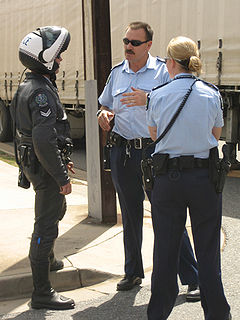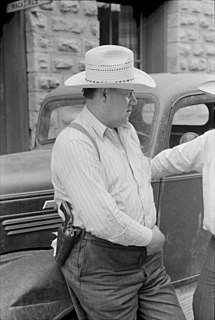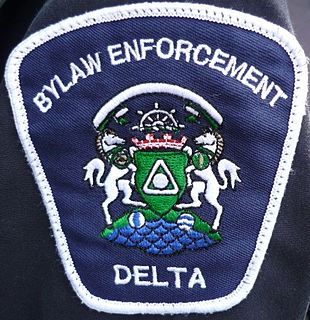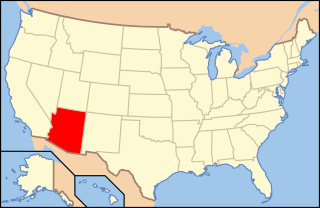An assault is the act of inflicting physical harm or unwanted physical contact upon a person or, in some specific legal definitions, a threat or attempt to commit such an action. It is both a crime and a tort and, therefore, may result in criminal prosecution, civil liability, or both. Generally, the common law definition is the same in criminal and tort law.
Marshal is a term used in several official titles in various branches of society. As marshals became trusted members of the courts of Medieval Europe, the title grew in reputation. During the last few centuries, it has been used for elevated offices, such as in military rank and civilian law enforcement.

A police officer, also known as an officer, policeman, or a policewoman is a warranted law employee of a police force. In most countries, "police officer" is a generic term not specifying a particular rank. In some, the use of the rank "officer" is legally reserved for military personnel.
In some countries, security police are those persons employed by or for a governmental agency or corporation with large campuses to provide police and security services to those agencies' properties.
Fire police are volunteer fire brigade/company members who, based upon their jurisdictional authority, receive sworn police powers, special training, and support firefighting efforts at emergency incidents. In addition to securing firefighting equipment, incident and fire scenes, and the station itself, fire police perform traffic and crowd control. In some jurisdictions, fire police are exterior firefighters and may be called upon at fire scenes to perform any of the duties of an interior firefighter except those that require a self-contained breathing apparatus. On occasion, fire police also assist regular police: they perform road closures, traffic control, crowd control at public events, missing persons searches, parade details, salvage, security, and other miscellaneous tasks as requested.

Law enforcement in Australia is one of the three major components of the country's justice system, along with courts and corrections. Law enforcement officers are employed by all three levels of government – federal, state/territory, and local.
A law enforcement officer (LEO), or peace officer in North American English, is a public-sector employee whose duties primarily involve the enforcement of laws. The phrase can include police officers, municipal law enforcement officers, special police officers, customs officers, state troopers, special agents, secret agents, special investigators, border patrol officers, immigration officers, court officers, probation officers, parole officers, arson investigators, auxiliary officers, game wardens, sheriffs, constables, corrections, marshals, deputies, detention officers, correction officers, sworn campus police officers and public safety officers. Security guards are civilians and therefore not law enforcement officers, unless they have been granted powers to enforce particular laws, such as those accredited under a community safety accreditation scheme such as a security police officer.
In some countries, resisting arrest is a criminal charge against an individual who has committed, depending on the jurisdiction, at least one of the following acts:

"Stop and identify" statutes are laws in several U.S. states that authorize police to lawfully order people whom they reasonably suspect of a crime to state their name. If there is not reasonable suspicion that a crime has been committed, is being committed, or is about to be committed, an individual is not required to provide identification, even in these states.
The Texas constable is provided for in the Texas Constitution of 1876, which calls for the election of a constable in each Texas precinct of a county, and counties may have between one and eight precincts each depending on their population. The term of office for Texas constables is four years. However, when vacancies arise, the commissioner's court of the respective county has the authority to appoint a replacement to serve out the remaining term. If no person is elected and qualified under law to fill an office of constable for seven consecutive years, the respective commissioner's court may declare the office dormant and it may not be filled by election or appointment. However, the commissioner's court may reinstate the office by a majority vote or by calling an election where a majority of precinct voters approve it.

The Harris County Sheriff's Office (HCSO) is a local law enforcement agency serving the over four million citizens of Harris County, Texas, United States. It is headquartered on the first and second floors in the 1200 Baker Street Jail in Downtown Houston.

In the United States, a sheriff is an official in a county or independent city responsible for keeping the peace and enforcing the law. Unlike most officials in law enforcement in the United States, sheriffs are usually elected, although some states have laws requiring certain law enforcement qualifications of candidates. Elected sheriffs are accountable directly to the citizens of their county, the constitution of their state, and ultimately the United States Constitution.

A bylaw enforcement officer is a law enforcement employee of a municipality, county or regional district, charged with the enforcement of bylaws, rules, laws, codes or regulations enacted by local governments. Bylaw enforcement officers are often out in the community responding to complaints from the public. They often work closely with local police, as well as provincial and federal authorities.

The Suffolk County Sheriff's Office is the oldest law enforcement agency in Suffolk County, New York, having been established in 1683. The Sheriff's Office currently employs over 1200 people, including 898 correction officers, 288 deputy sheriffs, and 130 civilian personnel. Its Office and Business Operations are located at the Riverhead Correctional Facility, 100 Center Drive South in Riverhead.

The Los Angeles County Sheriff's Department (LASD), officially the County of Los Angeles Sheriff's Department, is the United States' largest sheriff's department, with approximately 18,000 employees. The department's three main responsibilities entail providing patrol services for 153 unincorporated communities of Los Angeles County, California and 42 cities, providing courthouse security for the Superior Court of Los Angeles County, and the housing and transportation of inmates within the county jail system. In addition, the department contracts with the Los Angeles Metropolitan Transportation Authority and Metrolink, provides law enforcement services to ten community colleges, patrols over 177 county parks, golf courses, special event venues, two major lakes, 16 hospitals, and over 300 county facilities; and provides services, such as crime laboratories, homicide investigations, and academy training, to smaller law enforcement agencies within the county.

In the United States, the state police is a police body unique to each U.S. state, having statewide authority to conduct law enforcement activities and criminal investigations. In general, state police officers, known as state troopers, perform functions that do not fall within the jurisdiction of the county sheriff, such as enforcing traffic laws on state highways and interstate expressways, overseeing the security of the state capitol complex, protecting the governor, training new officers for local police forces too small to operate an academy and providing technological and scientific services. They support local police and help to coordinate multi-jurisdictional task force activity in serious or complicated cases in those states that grant full police powers statewide.

Firearm laws in Arizona regulate the sale, possession, and use of firearms and ammunition in the state of Arizona in the United States.
Refusing to assist a police officer, peace officer or other law enforcement officer is an offence in various jurisdictions around the world. Some jurisdictions use the terminology '"refusing to aid a police officer" or "failure to aid a police officer".
Capital punishment is a legal penalty in the U.S. state of Kentucky.
In the United States, there is no consistent use of the office of constable throughout the states; use may vary within a state. A constable may be an official responsible for service of process: such as summonses and subpoenas for people to appear in court in criminal and/or civil matters. They can also be fully empowered law enforcement officers. Constables may have additional specialized duties unique to the office. In some states, a constable may be appointed by the governor or a judge or magistrate of the court which he or she serves; in others, the constable is an elected or appointed position at the state or local level of local government. Their jurisdiction can vary from statewide to county/parish and local township boundaries based on the state's laws.









